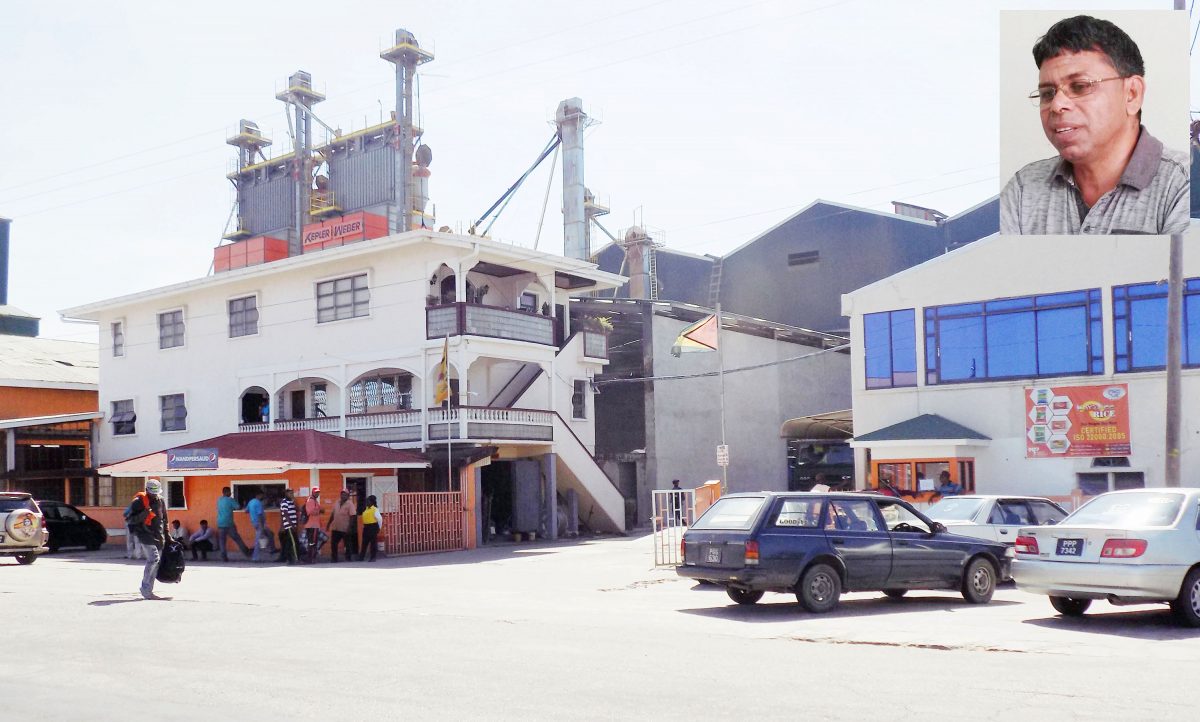Even as he hailed last year’s near record-breaking performance of the rice industry including the stellar sectorial performance of Region Six in 2019, the Chairman of the largest rice-milling operation in Guyana has told the Stabroek Business that he believes that performance of the sector can significantly exceed that of last year if what he described as “politics” were kept out of the sector.
In a telephone interview with the Stabroek Business on Wednesday, Chairman of the #36 Village, Corentyne rice milling operation, Nand Persaud & Company, Rajendra Persaud, asserted that some the deficiencies in the rice sector in Region Six were due to the failure of the regional administration to deliver, in a timely manner, key and critical services to the rice-growing community.
Even as he paid glowing tribute to the efforts of the farmers that yielded Region Six a return of 4,910,444 bags of paddy, last year, a 25% increase in production over the previous year, Persaud criticized the Region Six Regional Administration for what he saw as its failure to deliver critical services to the rice sector in a timely manner. Asserting that the welfare of the rice industry can only be assured if political differences are put aside and politics is kept out of the equation, Persaud told Stabroek Business that it had become a yearly practice that his company had to intervene to call on the regional administration for the release of water and for fuel to operate pumps in circumstances where they are fully aware of their duties. Noting that funds are usually available for the purchase of fuel Persaud said that there was no good reason why there should be a deficiency in this regard. “They should put political differences aside and do their work,” Persaud said.
Persaud told the Stabroek Business that the 2019 record-breaking accomplishment of the Region Six rice sector last year had been realized notwithstanding challenges associated with pests and diseases, adverse weather conditions and the lack of timeliness in the release of water. The Region Six businessman wants the Guyana Rice Development Board to further up its game in terms of becoming an integral part of the ongoing global research into new pest-resistant varieties of paddy and that this option might be realized through an existing research-based partial scope agreement with Brazil.
And against the backdrop of the country’s position as the leading local private sector player on the global rice marketing industry, Persaud struck a distinctively upbeat note on the likely immediate prospects for Guyana’s rice on the international market. According to Persaud not only are there available markets for Guyana’s rice but these exist in a season of good prices. He said that the average price for white packaged rice currently stands at US$475 per tonne while bulk white rice is being bought at US$440 per tonne.
Meanwhile, and for all its present political troubles, Persaud says that Venezuela still remains an attractive market for Guyana since that country purchases significant quantities of rice from Guyana for which ‘up front’ payments are made. Cuba, Persaud says, also remains an important market even though rice exports to that country are currently done on a credit basis.
Meanwhile, Persaud cites what he says is the continually dwindling availability of rice lands in Region Six as one of the sector’s most challenging problems. He told Stabroek Business that, perhaps ironically, it was the scarcity of suitable lands for increased production rather than a shortage of demand that was affecting the industry’s search for new markets. “We have hit the max land in Region Six,” Persaud said, adding that while the problem does not repose in the availability of land, per se, “there is a need to install the necessary infrastructure to bring those lands under cultivation,” a responsibility which he says, falls to government.
Persaud told Stabroek Business that a point had been reached where his own company was unable to secure sufficient supplies to meet its needs and that realizing the tonnage necessary to satisfy its current market needs had necessitated making purchases in Suriname.






